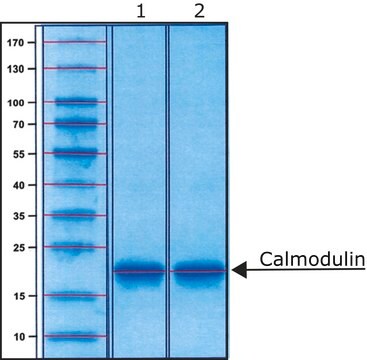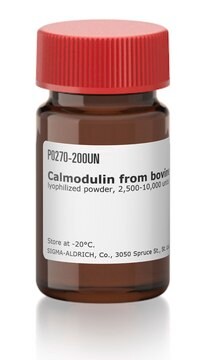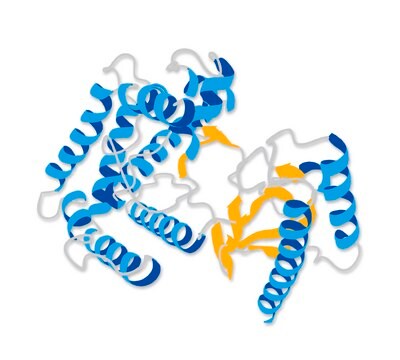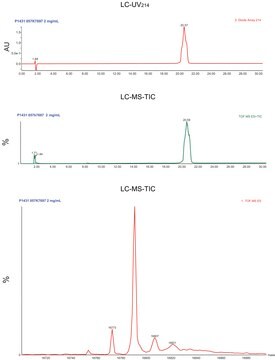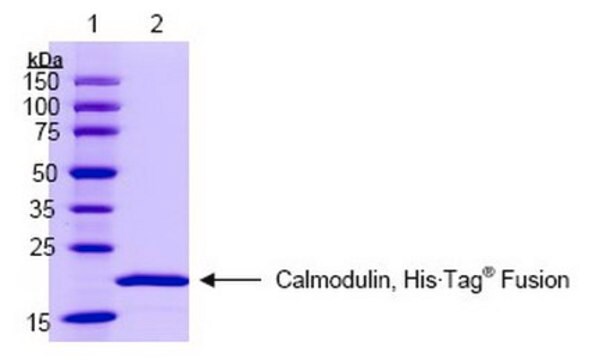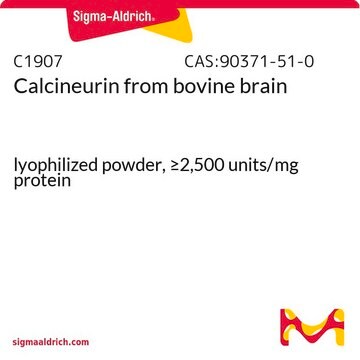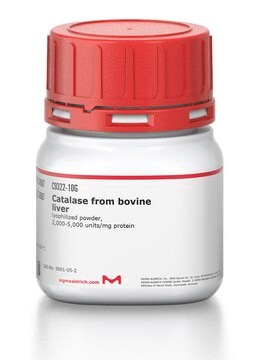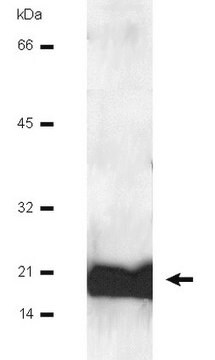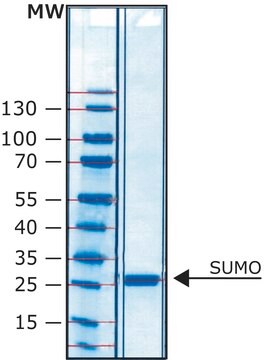SRP6310
Calmodulin from bovine brain
≥95% (SDS-PAGE)
Synonim(y):
CALM, CAM
Zaloguj sięWyświetlanie cen organizacyjnych i kontraktowych
About This Item
Kod UNSPSC:
12352200
NACRES:
NA.32
Polecane produkty
pochodzenie biologiczne
bovine brain
Próba
≥95% (SDS-PAGE)
Formularz
lyophilized
masa cząsteczkowa
16 kDa
opakowanie
pkg of 1 mg
pkg of 500 μg
przydatność
suitable for chromatography
numer dostępu UniProt
Warunki transportu
wet ice
temp. przechowywania
−20°C
informacje o genach
bovine ... CAM(520277)
Opis ogólny
Calmodulin (CaM) is a ubiquitous, calcium-binding protein. CaM is expressed in many cell types and can have different subcellular locations, including the cytoplasm, within organelles, or associated with the plasma or organelle membranes. Many of the proteins that CaM binds are unable to bind calcium themselves, and as such use CaM as a calcium sensor and signal transducer. CaM can also make use of the calcium stores in the endoplasmic reticulum, and the sarcoplasmic reticulum. CaM undergoes a conformational change upon binding to calcium, which enables it to bind to specific proteins for a specific response.
Zastosowanie
Calmodulin from bovine brain has been used to study calmodulin-associated endothelium-derived relaxing factor/nitric oxide synthase activity in the particulate and cytosolic fractions of bovine aortic endothelial cells. It has also been used as a standard in size-exclusion chromatography.
Działania biochem./fizjol.
Calmodulin (CaM) can bind to and regulate a multitude of different protein targets, thereby affecting many different cellular functions. It is involved in inflammation, metabolism, apoptosis, muscle contraction, intracellular movement, short-term and long-term memory, nerve growth and the immune response. CaM can bind up to four calcium ions, and can undergo post-translational modifications, such as phosphorylation, acetylation, methylation and proteolytic cleavage, each of which can potentially modulate its actions.
Postać fizyczna
Lyophilized in 30 mM Hepes, pH 7.4, 1 mM CaCl2 and 0.1 mM DTT.
Rekonstytucja
In water or aqueous buffer
Ta strona może zawierać tekst przetłumaczony maszynowo.
Hasło ostrzegawcze
Warning
Zwroty wskazujące rodzaj zagrożenia
Zwroty wskazujące środki ostrożności
Klasyfikacja zagrożeń
Eye Irrit. 2
Kod klasy składowania
11 - Combustible Solids
Klasa zagrożenia wodnego (WGK)
WGK 3
Temperatura zapłonu (°F)
Not applicable
Temperatura zapłonu (°C)
Not applicable
Wybierz jedną z najnowszych wersji:
Certyfikaty analizy (CoA)
Lot/Batch Number
Nie widzisz odpowiedniej wersji?
Jeśli potrzebujesz konkretnej wersji, możesz wyszukać konkretny certyfikat według numeru partii lub serii.
Masz już ten produkt?
Dokumenty związane z niedawno zakupionymi produktami zostały zamieszczone w Bibliotece dokumentów.
Intestinal calmodulin and calcium-binding protein differ in their distribution and in the effect of vitamin D steroids on their concentration.
Thomasset M, et al.
Febs Letters, 127, 13-16 (1981)
Teaching Molecular Biology using computational tools and tacking into account the learning styles of students.
Craciun D and Isvoran A
Romanian Biotechnological Letters, 14.4, 4567-4574 (2009)
Calmodulin methyltransferase is an evolutionarily conserved enzyme that trimethylates Lys-115 in calmodulin.
Magnani R, et al.
Nature Communications, 43, doi: 10-doi: 10 (2010)
Calmodulin is a subunit of nitric oxide synthase from macrophages.
Cho HJ, et al.
The Journal of Experimental Medicine, 176, 599-604 (1992)
Ca2+ binding and conformational change in two series of point mutations to the individual Ca(2+)-binding sites of calmodulin.
Maune JF, et al.
The Journal of Biological Chemistry, 267, 5286-5295 (1992)
Nasz zespół naukowców ma doświadczenie we wszystkich obszarach badań, w tym w naukach przyrodniczych, materiałoznawstwie, syntezie chemicznej, chromatografii, analityce i wielu innych dziedzinach.
Skontaktuj się z zespołem ds. pomocy technicznej